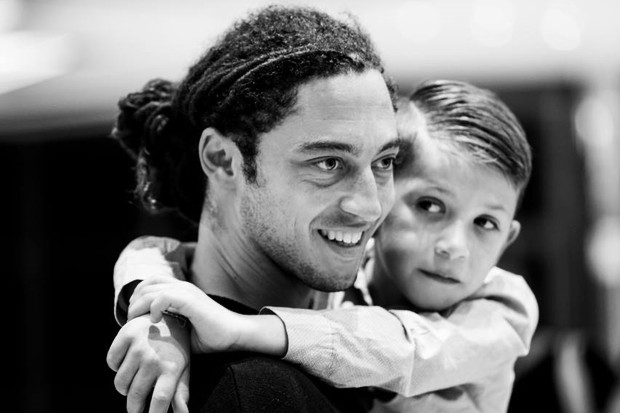Jonas Carpignano • Director
"Scorsese was my spiritual guide for my film about Gypsies"
- CANNES 2017: The Italian-American director has presented A Ciambra in the Directors’ Fortnight, a film that depicts the Roma community in Gioia Tauro, Calabria

The audience of the Directors’ Fortnight at the 70th Cannes Film Festival gave a very warm welcome to A Ciambra [+see also:
film review
trailer
interview: Jonas Carpignano
film profile], the second feature by Italian-American director Jonas Carpignano, who grew up in New York. The film tells the story of the non-migratory Roma community that lives in Gioia Tauro, Calabria, through the eyes of a young boy, Pio Amato. Carpignano’s feature debut, Mediterranea [+see also:
film review
trailer
interview: Jonas Carpignano
film profile], which was about African immigrants in Calabria, was presented in the Critics’ Week, where it received the Best Directorial Debut Award 2015 from the National Board of Review.
Cineuropa: How did the film come about? After your last movie focused on Africans, did you want to bring the Roma community to people’s attention?
Jonas Carpignano: I’ve been living in Gioia Tauro for seven years. The idea wasn’t to give a generic portrayal of the Roma community. My starting point is always a character, and this time I wanted to tell the story of Pio, whom I met four years ago. I was doing the casting for Mediterranea and came across this boy of less than 12 wearing this black leather jacket, who asked me for a cigarette. Straight away, I was struck by his attitude, which was so different from the others.
And did you meet the whole community?
That began with a car that they stole from us while we were shooting a short film seven years ago. When they steal something from you in Gioia Tauro, you approach the Gypsies; I went to them and I fell in love with their energy. I started to hang out in Ciambra over a span of five years, thinking about the film I wanted to make. I became close to the Amato family and I began to adapt the screenplay that I already had in mind, enriching it with elements from their real life.
While shooting did you stick to a rigid script, or was there room for improvisation?
My way of working is always to write the screenplay while living my life; I hear certain lines, I write them and then I insert them into the script. For this film, as I had done for Mediterranea, I chose non-professional actors for the leads, who belonged to the world I was portraying. It might seem like it was all improvised, but there was a proper screenplay that we stuck to.
In a realistic way, the movie confirms a few stereotypes...
But I don’t think I’ve bad-mouthed the Roma community, whom I love with all my heart and consider as family. The important thing is to show the human side, looking beyond the stereotypes. I try to avoid being a “do-gooder” at all costs; the challenge I set myself, and which I also set for the viewer, was to show what they really are, and love them in spite of everything, making people realise that they are people just like us, even if they steal.
Martin Scorsese wanted to board the project as executive producer. How did that go?
It was very exciting. Scorsese was a kind of spiritual guide! He loved a photo book on Ciambra that I made, and he asked to read the screenplay for the movie. But he didn’t interfere with it. He then saw a version of the edit, and gave us some advice on the cuts and the sound. It was really important to take his comments on board. His presence definitely had some kind of influence on the end result.
(Translated from Italian)
Did you enjoy reading this article? Please subscribe to our newsletter to receive more stories like this directly in your inbox.
















